

The Dorothy Kuya archive project, a commission awarded by National Museums Liverpool, lasted from October 2022 – August 2023. This was a highly successful project based around the archive, life and work of one of Liverpool’s most prolific antiracist campaigners. Our work drew national and international attention to the legacy of Dorothy Kuya, as well as the unique methodological approach of WoW’s Creative Heritage.
In line with our ethos and that of Dorothy’s political activism, we wanted to centre participants from the local community in the cataloguing process of their own distinct heritage. During the project we developed strong ties with the team at the International Slavery Museum, Maritime Museum archives and with our dedicated team of project participants, whose passion was essential to the projects success.
We produced monthly blogs revealing stories from the archive, and social media campaigns to promote Dorothy’s legacy. We organised the International Women’s Day event, Celebrating Dorothy, with the International Slavery Museum. We co-produced a walking tour with participants during WoWFest and archive handling session at Granby Winter Garden. We commissioned visual artist Sumuyya Khader to lead workshops with participants to design visual responses to the archive. We also produced a short podcast series and end of project celebration event at the Museum of Liverpool. You can find out more about the creative output below.
Project manager Janaya Pickett wrote and narrated The Dorothy Kuya Archive Podcast, which included tremendous research into Dorothy’s life and times, to disseminate the vast amount of knowledge within the archive to as wide an audience as possible. This included many interviews with Liverpool 8 community activists, academics, former colleagues and friends of Dorothy (including former councillor and wife of the late MP Bernie Grant, and MP for Islington North, Jeremy Corbyn).
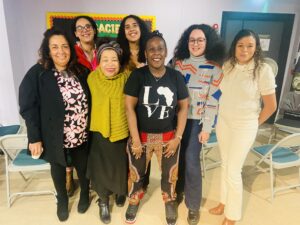
In March 2023, we hosted the ‘Celebrating Dorothy’ event in honour of International Women’s Day, a collaborative effort with the International Slavery Museum.
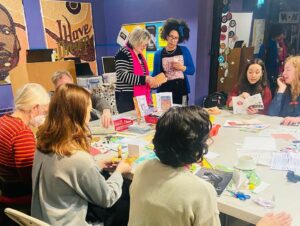
There was a vibrant pop-up feminist library made up of books and publications from Dorothy’s personal collection, a ‘living library’, offering a unique opportunity to engage in conversations with trailblazing black Liverpool women, as well as a zine-making workshop led by the multi-disciplinary artist Seleena Laverne Daye.

As part of the project the team produced monthly blogs on the progress of the Dorothy Kuya Archive, as well uncovering some of the material from the archive and exploring it’s associated history.
You can read and download all the blog posts here.

Dorothy Kuya: A Legacy of Black Liverpool was a celebration marking the end of Dorothy Kuya Archive project.
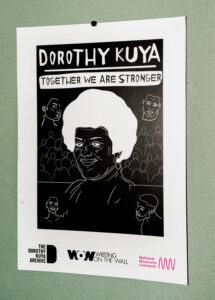
We were thrilled to have Sharon Grant OBE as a special guest speaker. Sharon is a community activist and wife of the late MP Bernie Grant. Sharon is chair of Public Voice CIC, Healthwatch Haringey and played a prominent role in establishing the Bernie Grant Arts Centre and Bernie Grant Trust. Sharon and Bernie were great friends and colleagues of Dorothy Kuya who worked with her closely on the Broadwater Farm Inquiry and African Reparations movement during the 1990s.
The event also featured a performance by Liverpool’s legendary griot, Levi Tafari, who began his writing journey as a young man at the L8 Writers Workshop, an initiative set up by Dorothy Kuya.
At the event we also revealed commissioned creative response from visual artist Sumuyya Khader, as well as the Dorothy Kuya inspired posters that our participants created at her Granby Press studio.
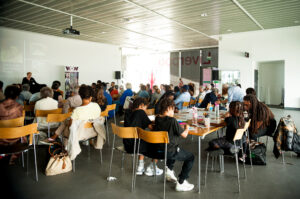
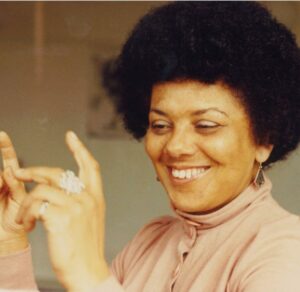 Dorothy was born in Liverpool 8, the daughter of a white British mother and West African father, during a time of extreme racism, both institutionally and publicly. Her activism began at an early age, attending her first Young Communist League (YCL) meeting aged 13 and becoming involved in the post-war anti-colonial and labour movements.
Dorothy was born in Liverpool 8, the daughter of a white British mother and West African father, during a time of extreme racism, both institutionally and publicly. Her activism began at an early age, attending her first Young Communist League (YCL) meeting aged 13 and becoming involved in the post-war anti-colonial and labour movements.
As well as training to be a nurse and then a teacher, Dorothy was an active Communist Party member throughout the 1960s and 70s. She became Liverpool’s first Senior Community Relations Officer for the newly established Merseyside Community Relations Council in 1970, a post held for 7 years.
Throughout the decades Dorothy campaigned relentlessly as an educator, against racism in children’s books and in the school system.
In the 1980s Dorothy worked with the National Assembly of Women as secretary and late vice-chair. She set up her own consultancy firm, the DK Consultancy, to provide training racism training for institutions and organisations.
In the 1990s Dorothy was an early member of the Granby Residents Association, which later developed into the Granby 4 Streets Community Land Trust. She was central to the establishment of what is now the International Slavery Museum. This is just a condensed version of the fantastic achievements of this phenomenal woman.
The Dorothy Kuya archive collection is now available to access via the Merseyside Maritime Museum Archive Centre.
